Module 8 Choosing presents Unit 3 Language in use.课件(共31张PPT)
文档属性
| 名称 | Module 8 Choosing presents Unit 3 Language in use.课件(共31张PPT) |  | |
| 格式 | ppt | ||
| 文件大小 | 2.5MB | ||
| 资源类型 | 教案 | ||
| 版本资源 | 外研版 | ||
| 科目 | 英语 | ||
| 更新时间 | 2022-07-27 22:33:55 | ||
图片预览

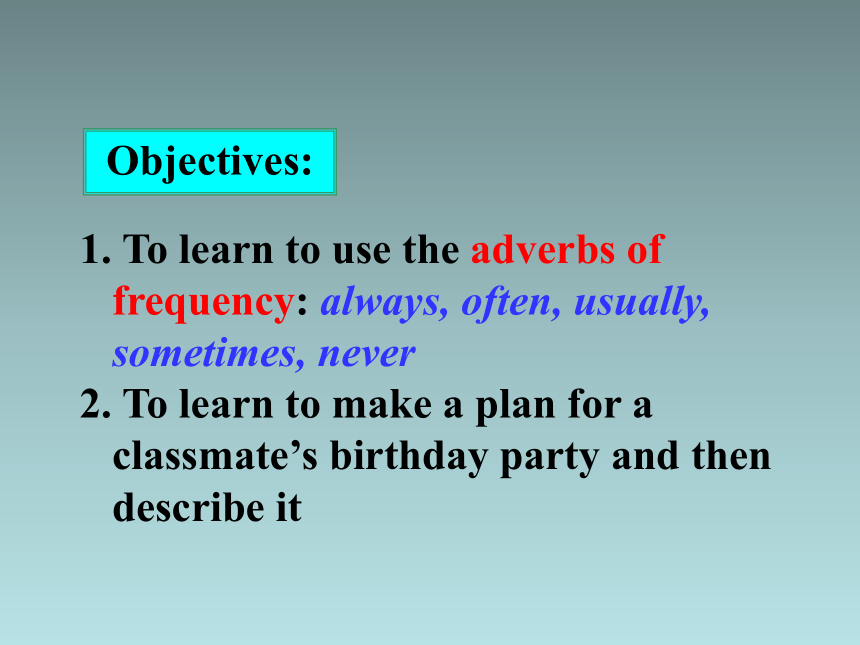
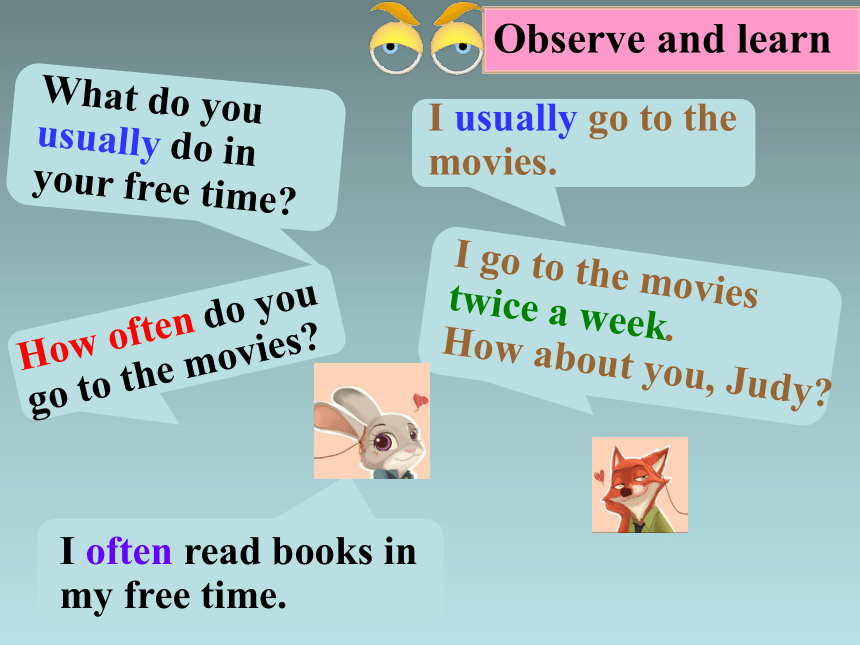
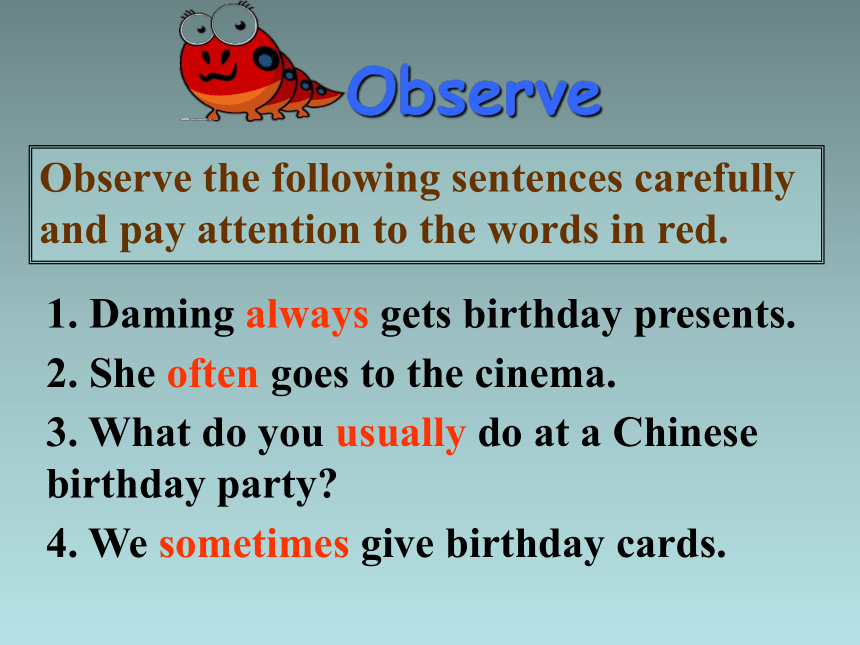
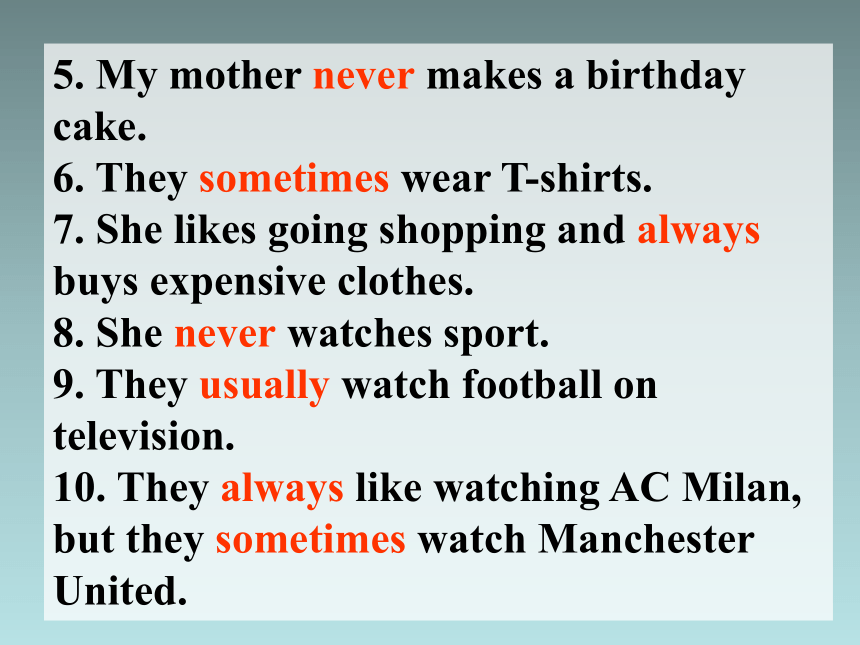

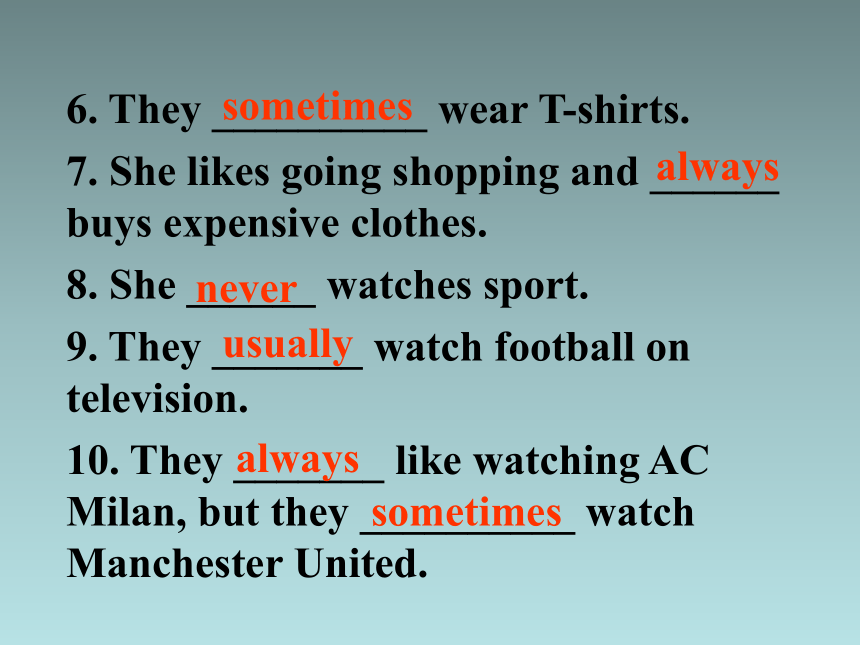
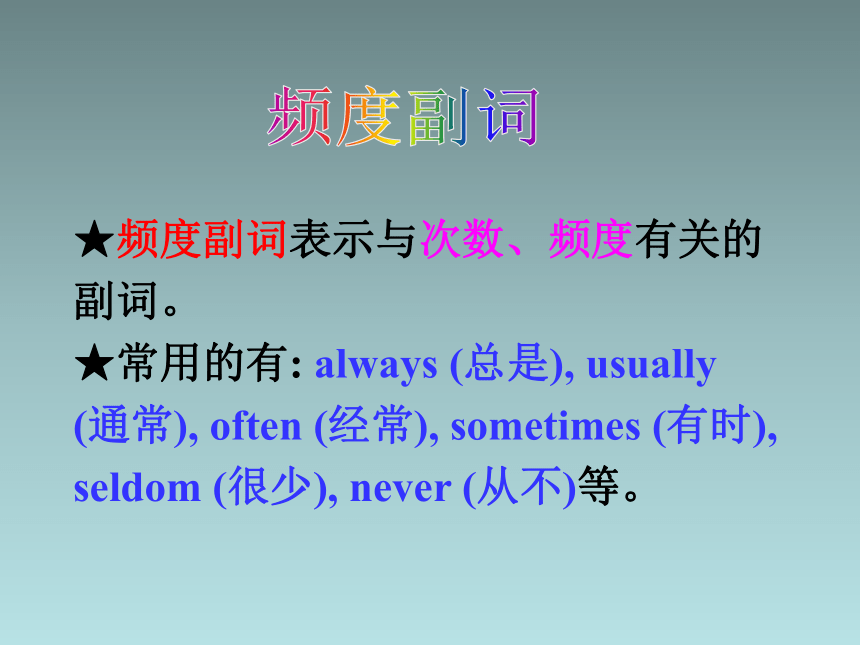
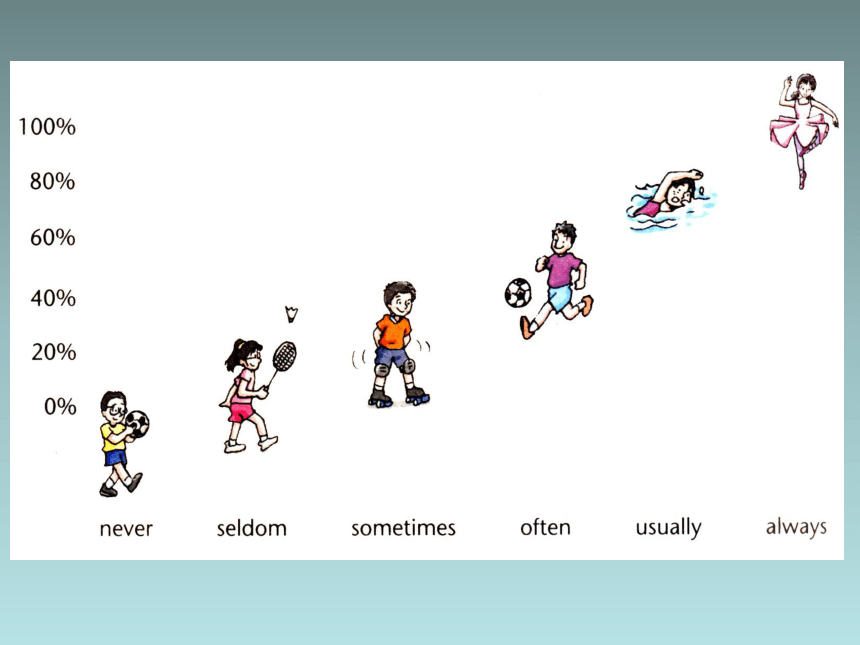
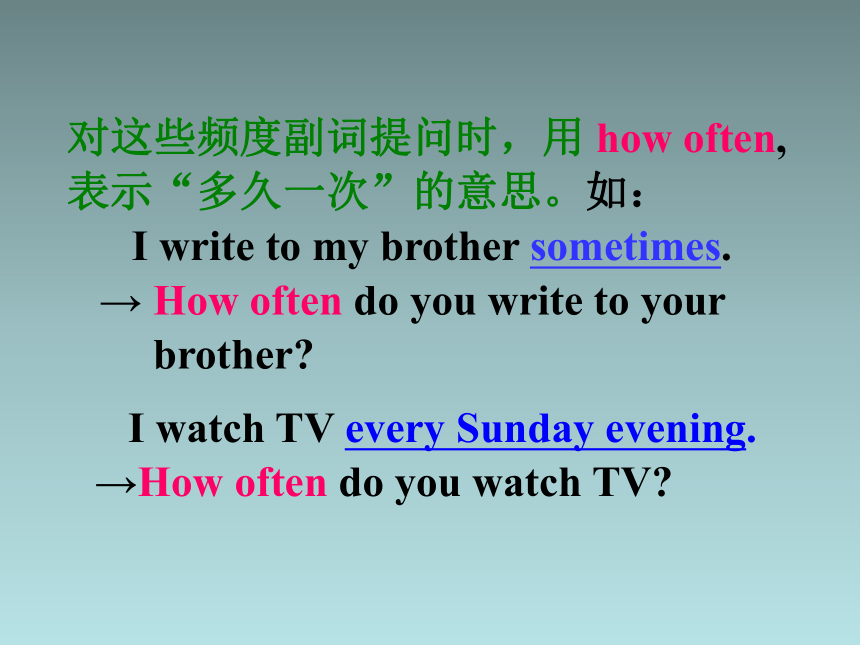
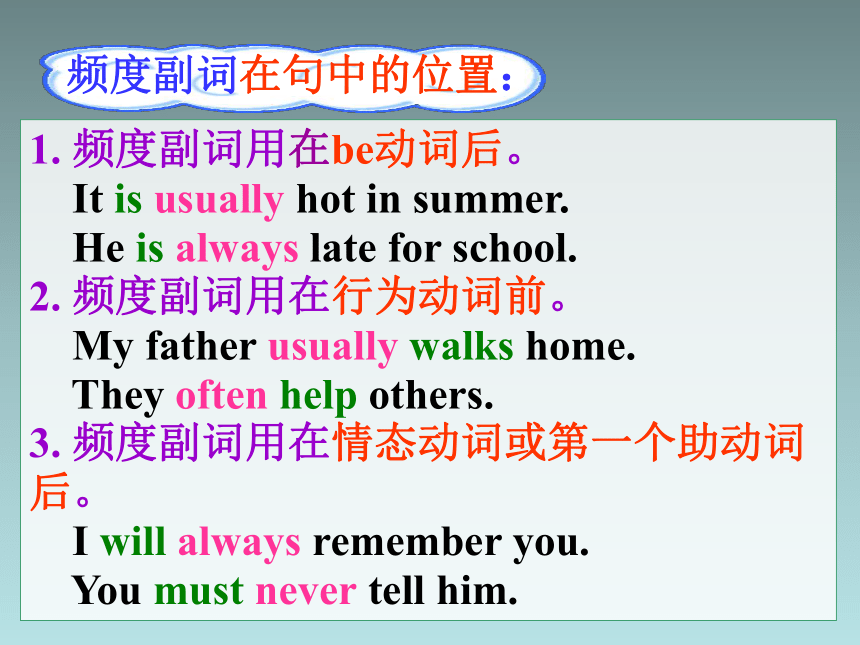
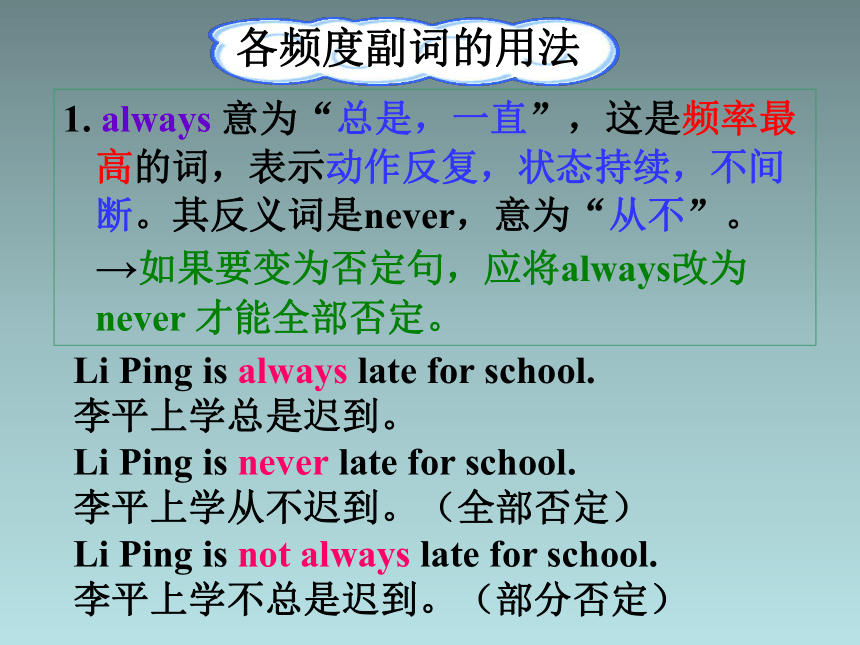
文档简介
(共31张PPT)
Module 8
Choosing presents
Objectives:
To learn to use the adverbs of frequency: always, often, usually, sometimes, never
To learn to make a plan for a classmate’s birthday party and then describe it
What do you usually do in your free time
I usually go to the movies.
How often do you go to the movies
I go to the movies twice a week.
How about you, Judy
I often read books in my free time.
Observe and learn
1. Daming always gets birthday presents.
2. She often goes to the cinema.
3. What do you usually do at a Chinese birthday party
4. We sometimes give birthday cards.
Observe the following sentences carefully and pay attention to the words in red.
Observe
5. My mother never makes a birthday cake.
6. They sometimes wear T-shirts.
7. She likes going shopping and always buys expensive clothes.
8. She never watches sport.
9. They usually watch football on television.
10. They always like watching AC Milan, but they sometimes watch Manchester United.
1. Daming _________ gets birthday presents.
2. She _________ goes to the cinema.
3. What do you __________ do at a Chinese birthday party
4. We _________ give birthday cards.
5. My mother __________ makes a birthday cake.
always
often
usually
sometimes
never
go
Ready
6. They __________ wear T-shirts.
7. She likes going shopping and ______ buys expensive clothes.
8. She ______ watches sport.
9. They _______ watch football on television.
10. They _______ like watching AC Milan, but they __________ watch Manchester United.
always
never
usually
always
sometimes
sometimes
★频度副词表示与次数、频度有关的副词。
★常用的有: always (总是), usually (通常), often (经常), sometimes (有时), seldom (很少), never (从不)等。
对这些频度副词提问时,用 how often, 表示“多久一次”的意思。如:
I write to my brother sometimes.
→ How often do you write to your
brother
I watch TV every Sunday evening.
→How often do you watch TV
1. 频度副词用在be动词后。
It is usually hot in summer.
He is always late for school.
2. 频度副词用在行为动词前。
My father usually walks home.
They often help others.
3. 频度副词用在情态动词或第一个助动词后。
I will always remember you.
You must never tell him.
频度副词在句中的位置:
各频度副词的用法
1. always 意为“总是,一直”,这是频率最高的词,表示动作反复,状态持续,不间断。其反义词是never,意为“从不”。
→如果要变为否定句,应将always改为never 才能全部否定。
Li Ping is always late for school.
李平上学总是迟到。
Li Ping is never late for school.
李平上学从不迟到。(全部否定)
Li Ping is not always late for school.
李平上学不总是迟到。(部分否定)
1) We usually go to school at seven in the morning.
我们通常在早上七点上学。
2) My mother and I usually go shopping on Sunday.
我和妈妈通常在星期天去买东西。
2. usually意为“通常”,表示习惯性动作或状态,很少例外。如:
1) The boys often eat noodles and the girls sometimes eat them.
男生经常吃面条,女生有时吃。
2) I often chat with my friends under the big tree.
我经常在这棵大树下和朋友聊天。
3) He writes to his friends quite often.
他常给他的朋友写信。
3. often意为“经常,时常”,表示反复性的动作或状态,中间有间断。
often在句尾时常被very或quite修饰。如:
1) Sometimes we go to the cinema and at other times we go for a walk.
有时我们去看电影,有时我们去散步。
2) I sometimes watch TV in the evening.
我有时晚上看电视。
3) My father has lunch in the factory sometimes.
我父亲有时在工厂吃午饭。
4. sometimes意为“有时”,表示动作偶尔发生,间隔较长。
其位置比较灵活,放在句首、句中、句末都可。如:
1) The boys never eat chocolate and the girls seldom eat it.
男生从不吃巧克力,女生很少吃。
2) Better late than never. [谚语]
迟到(迟做)总比不来(不做)好。
5. never意为“从来不,从来没有”,表示从未发生的动作或情况,没有例外。如:
We usually go to the cinema four times a month.
我们通常一个月看四次电影。
另外,once a year (每年一次), twice a week (每周两次),three times a day (一天三次),every Saturday afternoon (每星期六下午)等,这些时间状语也表示频率,它们可以和频度副词用在同一个句子中,表达上没有重复。如:
以下部分为课本练习,供老师在对答案时选择使用。
Work in pairs. Ask and answer questions about Grandpa.
Grandpa
Watch TV always
Play football sometimes
Go to the cinema never
Read books usually
Listen to music often
Go shopping sometimes
People
Activity
P52
1
--Does Grandpa always watch TV
--Yes, he does.
P52
2
Complete the table in Activity 1 about yourself.
--Do you always watch TV
--Yes, I do.
Now work in pairs. Ask and answer.
You
Watch TV
Play football
Go to the cinema
Read books
Listen to music
Go shopping
People
Activity
always
For example:
Rewrite the sentences with the words in brackets.
1. I go to the cinema. (often)
_________________________
2. He plays football on Saturday. (usually)
________________________________
3. She gets up at 7:00 am. (always)
______________________________
4. They eat chocolate at home. (never)
_______________________________
P52
3
I often go to the cinema.
He usually plays football on Saturday.
She always gets up at 7:00 am.
They never eat chocolate at home.
Complete the sentences with Would you like or Let’s.
Would you like to go to the playground and play football
1. ____________ to go to the football match
2. ____________ go to a taijiquan class.
3. ____________ stay at home.
4. ____________ to go to the cinema It’s Jackie Chan.
5. ____________ to watch TV
6. ____________ play basketball.
P52
4
Would you like
Let’s
Let’s
Would you like
Would you like
Let’s
Read the emails and check(√) the true sentences.
1. Mike’s birthday party begins at 4:00 pm.
2. Jane doesn’t want to go to the party.
3. Jack has got a little sister.
4. Jack always does his homework
on Saturday afternoon.
P53
5
√
×
√
×
would like
watches his little sister play football
Planning a classmate’s birthday party
Ⅰ. Work in pairs. Ask and answer questions about each other’s birthday party.
1. When is your birthday
2. Do you always have a birthday party
3. What do you usually do at your birthday party
Ⅱ. Plan a birthday party for your partner.
Don’t say who your partner is.
Ask the class to guess who your partner is.
Choose the time and place.
Choose the food.
Choose what to do.
Ⅲ. Work with the whole class. Describe your plans for your partner’s birthday party.
1. 频度副词置于助动词,情态动词和be动词之后,行为动词之前。
2. always (总是) ﹥ usually (通常)﹥
often (常常)﹥sometimes (有时) ﹥
seldom (不常)﹥never (从不)
I. 根据要求改写下列句子。
1. I often go to the cinema on Sunday.
(改为完全否定)
I _______ ____ to the cinema on Sunday.
2. Mike sometimes goes to a Taijiquan class.
(对划线部分提问)
________ _______ does Mike go to a
Taijiquan class
never go
How often
Quiz
II. 根据汉语提示完成下列句子。 1. 我非常喜欢英语,所以我总是在早上
读英语。 I like English very much, so I _______
______ English in the morning. 2. 周末苏珊通常在七点钟起床。 Susan _______ ______ _____ at seven
at weekends.
always
usually gets up
read
3. 王老师经常帮助我学习英语。 Miss Wang _____ _____ me with my English. 4. 露西有时在星期六和她母亲一起去购物。 Lucy _________ _______ ________
with her mother on Saturday. 5. 我表弟从不吃冰淇淋。 My cousin _______ ______ ice cream.
often helps
never eats
sometimes goes shopping
1. Review the grammar we’ve learnt today.
2. Finish the exercises in Learning English.
3. Preview the new words and
expressions in Module 9.
Homework
Module 8
Choosing presents
Objectives:
To learn to use the adverbs of frequency: always, often, usually, sometimes, never
To learn to make a plan for a classmate’s birthday party and then describe it
What do you usually do in your free time
I usually go to the movies.
How often do you go to the movies
I go to the movies twice a week.
How about you, Judy
I often read books in my free time.
Observe and learn
1. Daming always gets birthday presents.
2. She often goes to the cinema.
3. What do you usually do at a Chinese birthday party
4. We sometimes give birthday cards.
Observe the following sentences carefully and pay attention to the words in red.
Observe
5. My mother never makes a birthday cake.
6. They sometimes wear T-shirts.
7. She likes going shopping and always buys expensive clothes.
8. She never watches sport.
9. They usually watch football on television.
10. They always like watching AC Milan, but they sometimes watch Manchester United.
1. Daming _________ gets birthday presents.
2. She _________ goes to the cinema.
3. What do you __________ do at a Chinese birthday party
4. We _________ give birthday cards.
5. My mother __________ makes a birthday cake.
always
often
usually
sometimes
never
go
Ready
6. They __________ wear T-shirts.
7. She likes going shopping and ______ buys expensive clothes.
8. She ______ watches sport.
9. They _______ watch football on television.
10. They _______ like watching AC Milan, but they __________ watch Manchester United.
always
never
usually
always
sometimes
sometimes
★频度副词表示与次数、频度有关的副词。
★常用的有: always (总是), usually (通常), often (经常), sometimes (有时), seldom (很少), never (从不)等。
对这些频度副词提问时,用 how often, 表示“多久一次”的意思。如:
I write to my brother sometimes.
→ How often do you write to your
brother
I watch TV every Sunday evening.
→How often do you watch TV
1. 频度副词用在be动词后。
It is usually hot in summer.
He is always late for school.
2. 频度副词用在行为动词前。
My father usually walks home.
They often help others.
3. 频度副词用在情态动词或第一个助动词后。
I will always remember you.
You must never tell him.
频度副词在句中的位置:
各频度副词的用法
1. always 意为“总是,一直”,这是频率最高的词,表示动作反复,状态持续,不间断。其反义词是never,意为“从不”。
→如果要变为否定句,应将always改为never 才能全部否定。
Li Ping is always late for school.
李平上学总是迟到。
Li Ping is never late for school.
李平上学从不迟到。(全部否定)
Li Ping is not always late for school.
李平上学不总是迟到。(部分否定)
1) We usually go to school at seven in the morning.
我们通常在早上七点上学。
2) My mother and I usually go shopping on Sunday.
我和妈妈通常在星期天去买东西。
2. usually意为“通常”,表示习惯性动作或状态,很少例外。如:
1) The boys often eat noodles and the girls sometimes eat them.
男生经常吃面条,女生有时吃。
2) I often chat with my friends under the big tree.
我经常在这棵大树下和朋友聊天。
3) He writes to his friends quite often.
他常给他的朋友写信。
3. often意为“经常,时常”,表示反复性的动作或状态,中间有间断。
often在句尾时常被very或quite修饰。如:
1) Sometimes we go to the cinema and at other times we go for a walk.
有时我们去看电影,有时我们去散步。
2) I sometimes watch TV in the evening.
我有时晚上看电视。
3) My father has lunch in the factory sometimes.
我父亲有时在工厂吃午饭。
4. sometimes意为“有时”,表示动作偶尔发生,间隔较长。
其位置比较灵活,放在句首、句中、句末都可。如:
1) The boys never eat chocolate and the girls seldom eat it.
男生从不吃巧克力,女生很少吃。
2) Better late than never. [谚语]
迟到(迟做)总比不来(不做)好。
5. never意为“从来不,从来没有”,表示从未发生的动作或情况,没有例外。如:
We usually go to the cinema four times a month.
我们通常一个月看四次电影。
另外,once a year (每年一次), twice a week (每周两次),three times a day (一天三次),every Saturday afternoon (每星期六下午)等,这些时间状语也表示频率,它们可以和频度副词用在同一个句子中,表达上没有重复。如:
以下部分为课本练习,供老师在对答案时选择使用。
Work in pairs. Ask and answer questions about Grandpa.
Grandpa
Watch TV always
Play football sometimes
Go to the cinema never
Read books usually
Listen to music often
Go shopping sometimes
People
Activity
P52
1
--Does Grandpa always watch TV
--Yes, he does.
P52
2
Complete the table in Activity 1 about yourself.
--Do you always watch TV
--Yes, I do.
Now work in pairs. Ask and answer.
You
Watch TV
Play football
Go to the cinema
Read books
Listen to music
Go shopping
People
Activity
always
For example:
Rewrite the sentences with the words in brackets.
1. I go to the cinema. (often)
_________________________
2. He plays football on Saturday. (usually)
________________________________
3. She gets up at 7:00 am. (always)
______________________________
4. They eat chocolate at home. (never)
_______________________________
P52
3
I often go to the cinema.
He usually plays football on Saturday.
She always gets up at 7:00 am.
They never eat chocolate at home.
Complete the sentences with Would you like or Let’s.
Would you like to go to the playground and play football
1. ____________ to go to the football match
2. ____________ go to a taijiquan class.
3. ____________ stay at home.
4. ____________ to go to the cinema It’s Jackie Chan.
5. ____________ to watch TV
6. ____________ play basketball.
P52
4
Would you like
Let’s
Let’s
Would you like
Would you like
Let’s
Read the emails and check(√) the true sentences.
1. Mike’s birthday party begins at 4:00 pm.
2. Jane doesn’t want to go to the party.
3. Jack has got a little sister.
4. Jack always does his homework
on Saturday afternoon.
P53
5
√
×
√
×
would like
watches his little sister play football
Planning a classmate’s birthday party
Ⅰ. Work in pairs. Ask and answer questions about each other’s birthday party.
1. When is your birthday
2. Do you always have a birthday party
3. What do you usually do at your birthday party
Ⅱ. Plan a birthday party for your partner.
Don’t say who your partner is.
Ask the class to guess who your partner is.
Choose the time and place.
Choose the food.
Choose what to do.
Ⅲ. Work with the whole class. Describe your plans for your partner’s birthday party.
1. 频度副词置于助动词,情态动词和be动词之后,行为动词之前。
2. always (总是) ﹥ usually (通常)﹥
often (常常)﹥sometimes (有时) ﹥
seldom (不常)﹥never (从不)
I. 根据要求改写下列句子。
1. I often go to the cinema on Sunday.
(改为完全否定)
I _______ ____ to the cinema on Sunday.
2. Mike sometimes goes to a Taijiquan class.
(对划线部分提问)
________ _______ does Mike go to a
Taijiquan class
never go
How often
Quiz
II. 根据汉语提示完成下列句子。 1. 我非常喜欢英语,所以我总是在早上
读英语。 I like English very much, so I _______
______ English in the morning. 2. 周末苏珊通常在七点钟起床。 Susan _______ ______ _____ at seven
at weekends.
always
usually gets up
read
3. 王老师经常帮助我学习英语。 Miss Wang _____ _____ me with my English. 4. 露西有时在星期六和她母亲一起去购物。 Lucy _________ _______ ________
with her mother on Saturday. 5. 我表弟从不吃冰淇淋。 My cousin _______ ______ ice cream.
often helps
never eats
sometimes goes shopping
1. Review the grammar we’ve learnt today.
2. Finish the exercises in Learning English.
3. Preview the new words and
expressions in Module 9.
Homework
同课章节目录
- Starte
- Module 1 My teacher and my friends
- Module 2 My English lesson
- Module 3 My English book
- Module 4 My everyday life
- Module 1 My classmates
- Unit 1 Nice to meet you.
- Unit 2 I'm Wang Lingling and I'm thirteen years ol
- Unit 3 Language in use.
- Module 2 My family
- Unit 1 Is this your mum?
- Unit 2 These are my parents.
- Unit 3 Language in use.
- Module 3 My school
- Unit 1 There are thirty students in my class.
- Unit 2 The library is on the left of the playgroun
- Unit 3 Language in use.
- Module 4 Healthy food
- Unit 1 We've got lots of apples.
- Unit 2 Is your food and drink healthy?
- Unit 3 Language in use.
- Module 5 My school day
- Unit 1 I love history.
- Unit 2 We start work at nine o'clock.
- Unit 3 Language in use.
- Revision module A
- Module 6 A trip to the zoo
- Unit 1 Does it eat meat?
- Unit 2 The tiger lives in Asia.
- Unit 3 Language in use.
- Module 7 Computers
- Unit 1 How do I write my homework on the computer?
- Unit 2 When do you use a computer?
- Unit 3 Language in use.
- Module 8 Choosing presents
- Unit 1 I always like birthday parties.
- Unit 2 She often goes to concerts.
- Unit 3 Language in use.
- Module 9 People and places
- Unit 1 We're enjoying the school trip a lot.
- Unit 2 They're waiting for buses or trains.
- Unit 3 Language in use.
- Module 10 Spring Festival
- Unit 1 Are you getting ready for Spring Festival?
- Unit 2 My mother's cleaning our houses and sweepin
- Unit 3 Language in use.
- Revision module B
